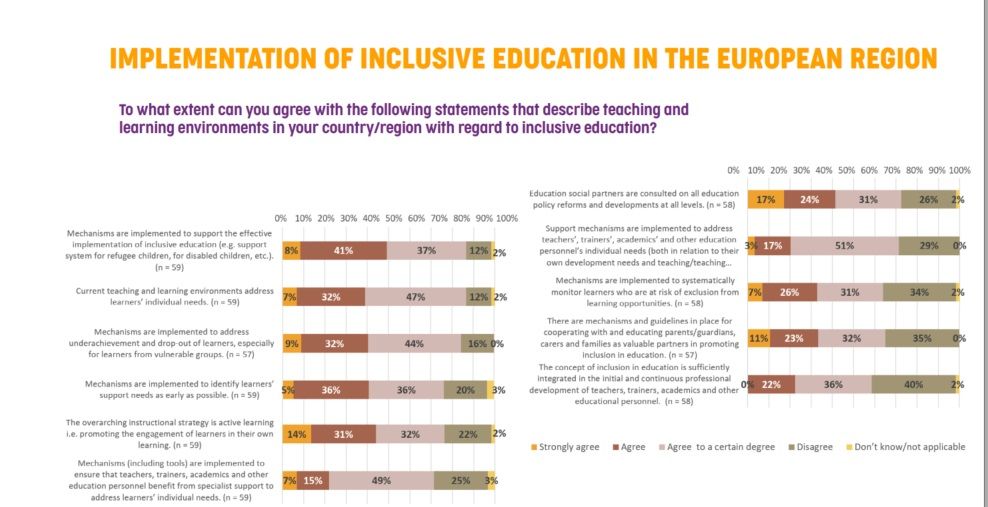
Embracing diversity in education: New ETUCE research on inclusive education
Necessary policy frameworks, relevant initial and continuous professional development, teacher support mechanisms, and meaningful involvement of education personnel as well as trade unions in the decision-making are among the most crucial conditions for successful implementation of inclusive education in Europe. These and other recommendations are highlighted in the newest ETUCE study‘ Embracing diversity in education’(2019-2021) which has been prepared in the framework of the ETUCE project “ Education Trade Unions and Inclusive Schools: Embracing Diversity in Education” and launched today at the project’s training seminar.
The study conducted for ETUCE by Dominique Danau (SAGO Research) is based on the desk research of various inclusive education systems in the European region and an online survey among ETUCE member organisations with respondents coming from 60 trade unions in 38 different countries. As a supplement to the research report, a Catalogue of Good practices on building and maintaining inclusive learning environments in various national and local contexts, is to be published in 2021.

The report shows that the increase of diversity in European societies represents both challenges and opportunities for the implementation of inclusive education. Other factors as digitalisation, rising inequalities, marketisation and privatisation of education, the rise of far-right discourse, growing individualism and more recently the current COVID-19 pandemic also have an impact on the implementation of inclusive education in Europe. In order to address these issues, the study proposes a number of recommendations on successful implementation of inclusive education for national and EU policy makers:
- A clear vision of inclusive education has to be embedded in policy frameworks, supporting the implementation of inclusive education;
- A meaningful involvement of teachers, academics and other education personnel in development, implementation and evaluation of inclusive education frameworks and strategies at all levels is a must;
- Provision of initial teacher training and continuous professional development of all teaching professionals, reflecting priorities, is necessary to accommodate working in a diverse education setting;
- Adequate supporting mechanisms, e.g. additional support personnel and time allocation for inclusion, have to be provided to all teaching professionals enabling the implementation of inclusive education approaches;
- Multi-agency approaches are key for the implementation of inclusive education;
- Leadership commitment and provision of necessary support to leadership are important conditions of embracing diversity in education;
- Suitable and purposeful assessment and monitoring systems have to be employed both at the level of education institutions and at the level of the learning process of students;
- Education trade unions need to be involved in discussions and negotiations concerning all aspects of inclusive education, including working conditions of education personnel; recruitment and retention in the education sector shaping the initial training and continuing professional development of education personnel, as well funding of inclusive education.
Furthermore, the study analyses training and professional needs of teachers, academics, leaders in educational institutions, and other education personnel, highlighting‘more inclusive support for students with special needs’, ‘ managing ‘difficult situations’ in the classroom’, and ‘ managing an increasing workload’ as the most pressing training needs in regard to inclusive education.
More information on the research is available here.
Read the Research Report‘ Embracing diversity in Education’ ( EN, FR, RU)
Check out the Factsheets: